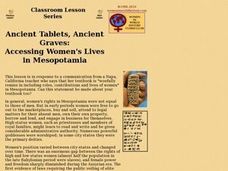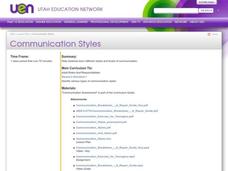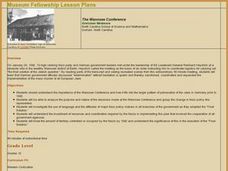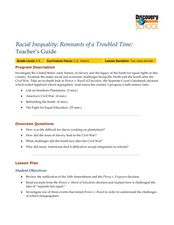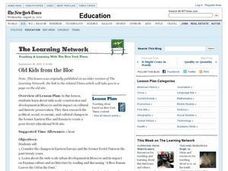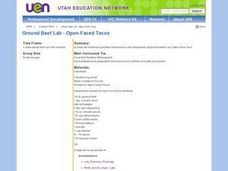Curated OER
A Plop and Fizz
Seventh graders perform an experiment to determine the effect of temperature on reaction rates. In this chemistry lesson, 7th graders take measurements and record data. They create a graph and analyze results.
Curated OER
Ancient Tablets, Ancient Graves: Accessing Women's Lives in Mesopotamia
Students explore the role of women in ancient Mesopotamia. Several excerpts from the Mesopotamian cuneiform tablets and artifacts are analyzed to determine the treatment, rights, and powers of women in this era.
Curated OER
How Do You Like Your Eggs?
First graders conduct a poll about how people like their eggs. In this graphing lesson, 1st graders collect data about how they like their eggs. Students use a picture of themselves to place under the type of egg they like. Students then...
Curated OER
Egyptian Hireroglyphs
Fifth graders identify the aspects of Ancient Egyptians and Heiroglyphs. They compare and contrast Egyptian Hieroglyphs with the decimal number system. Students recognize the decimal number system and compares to bases other than ten.
Curated OER
Types of Love (Dat)
Students examine the different types of love. They identify the various types of love and the behaviors associated with each. Although there are many kinds of love that we need to receive daily, most people will experience only one or...
Curated OER
Communication Styles
Students study different styles and levels of communication. They define the levels of communication and assess personal communication styles. They view a video and explore a webquest examining the topic "Strengthening Family and Self".
Curated OER
Cooperative Classroom Text Features Activities
Fifth graders examine text features and create a PowerPoint presentation. In this text features lesson, 5th graders go over Kagan Cooperative Learning Structures and text features before they choose one to include in a book and...
Curated OER
Bacteria and their viruses
Students listen and take lecture notes. They quietly watch a video on the bacteria and their viruses while taking notes on the video. They make 2 color drawings on blank paper, one showing a lytic virus and one showing a lysogenic virus.
Curated OER
EARLY CIVILIZATIONS
Students compare and contrast the monuments of four ancient cultures and draw conclusions about the origins, construction, and purposes of these structures.
Curated OER
Fertilizers & Grass Growth
Students design an experiment to test the effects of common fertilizers on grass growth. They write or present a laboratory report responding to their observations and consider how fertilizers may affect the soil environment.
Curated OER
The Wannsee Conference
Twelfth graders examine what occured at the Wannsee Conference during World War II. Using documents, they discover how the conference fits into the final solution of the Jewish question. They analyze the language used and the attitudes...
Curated OER
Racial Inequality: Remnants of a Troubled Time
Learners watch the Discovery program "Racial Inequality: Remnants of a Troubled Time" then examine the ratification of the 14th Amendment and the Plessy v. Ferguson decision. They research one of three events that tested Brown v. Board...
Curated OER
Ancient History Cyber-Journalists
Young scholars explore the ancient past. In this ancient civilizations lesson, students research ancient events and write newspaper articles about the events. Young scholars work in teams of 4 to produce group newspapers that feature...
Curated OER
East Meets West: Americans on the Move
Young scholars imagine what it was like to be part of the Lewis and Clark expedition. In this Lewis and Clark Expedition lesson plan, students watch "East Meets West: Americans on the Move," and then write journal entries from...
Curated OER
Coming to Terms with the Past
Students explore Holocaust survivor Simon Wiesenthal. They conduct research to examine how the post-Holocaust period has been handled historically and hold a teach-in to promote continued awareness of the Holocaust's impact.
Curated OER
Darwinist Dogma?
Students debate whether teachers should be mandated to present theories challenging evolution in their classrooms. For homework, they write letters to their local school board expressing their own opinions.
Curated OER
Old Kids From The Bloc
Young scholars study about wide scale construction and development in Moscow and its impact on cultural and historic preservation. They research the political, social, economic, and cultural changes in the former Eastern Bloc and create...
Curated OER
Just (Don't) Do It
Young scholars create age-appropriate, informational brochures examining health topics relating to sex, after learning about federally funded abstinence-only sex education.
Curated OER
Weather Investigation Through The Internet
Students explore the Earth's climatic regions and their characteristics. Using the Internet, they evaluate regional vegetation, agriculture, and population density. Students name and describe instruments that measure weather. They...
Curated OER
Open-Faced Tacos
Students practice safe handling procedures in a lab experience by handling ground beef properly in the preparation of a recipe. They prepare and assemble Open Faced Tacos. Afterward, they eat their prepared meal and complete several...
Curated OER
Analyzing documents
Students sort information pieces by structure and purpose. In this resource analysis lesson, students view several types of informational materials and work in teams to look for the way that piece is organized.
Curated OER
Properties of Color
Second graders explore the properties of primary color and investigate what happens when primary colors are mixed. They listen to the story The Crayon Box That Talked and list the colors. They experiment mixing primary colors and...
Curated OER
Colony Crops
Fifth graders determine which crops were grown in the 13 colonies depending on their climate and geography. They explore what crops are grown in the states created from the original colonies.
Curated OER
Is Evolution Just Monkey Business?
Students examine the presentation of the theory of evolution in the science classroom. They define and discuss aspects of evolution, evaluate the presentation of evolutionary theory, and write a persuasive essay.

